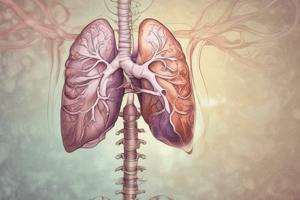Podcast
Questions and Answers
What is the primary function of the circulatory system?
What is the primary function of the circulatory system?
- Breaks down and absorbs nutrients from food
- Transports oxygen and nutrients to cells and removes waste (correct)
- Interprets and responds to stimuli
- Protects the body against pathogens and diseases
What is the term for the study of the patterns, causes, and effects of diseases?
What is the term for the study of the patterns, causes, and effects of diseases?
- Virology
- Pathology
- Epidemiology (correct)
- Bacteriology
Which type of disease is caused by inherited genetic mutations?
Which type of disease is caused by inherited genetic mutations?
- Genetic disease (correct)
- Infectious disease
- Chronic disease
- Cancer
What is the term for the growing trend of people choosing not to vaccinate?
What is the term for the growing trend of people choosing not to vaccinate?
Which system is responsible for bringing oxygen into the body and removing carbon dioxide?
Which system is responsible for bringing oxygen into the body and removing carbon dioxide?
What is the term for the abnormal cell growth that can invade and damage surrounding tissues?
What is the term for the abnormal cell growth that can invade and damage surrounding tissues?
What is the primary goal of disease prevention?
What is the primary goal of disease prevention?
What is the term for the increasing inability of antibiotics to effectively treat bacterial infections?
What is the term for the increasing inability of antibiotics to effectively treat bacterial infections?
Which system is responsible for protecting the body against pathogens and diseases?
Which system is responsible for protecting the body against pathogens and diseases?
What is the term for the disparities in healthcare access, quality, and outcomes across different populations and regions?
What is the term for the disparities in healthcare access, quality, and outcomes across different populations and regions?
Flashcards are hidden until you start studying
Study Notes
Health and Diseases
Human Body Systems
- Nervous system: controls body functions, interprets and responds to stimuli
- Circulatory system: transports oxygen and nutrients to cells, removes waste
- Respiratory system: brings oxygen into the body, removes carbon dioxide
- Immune system: protects the body against pathogens and diseases
- Digestive system: breaks down and absorbs nutrients from food
Types of Diseases
- Infectious diseases: caused by pathogens such as bacteria, viruses, fungi, and parasites
- Examples: tuberculosis, influenza, HIV/AIDS, malaria
- Chronic diseases: long-term, persistent conditions that can be managed but not cured
- Examples: diabetes, hypertension, heart disease, asthma
- Genetic diseases: caused by inherited genetic mutations
- Examples: sickle cell anemia, cystic fibrosis, Huntington's disease
- Cancer: abnormal cell growth that can invade and damage surrounding tissues
Health and Disease Management
- Prevention: avoiding risk factors, practicing healthy habits, and receiving vaccinations
- Diagnosis: identifying diseases through medical tests, exams, and observations
- Treatment: managing symptoms, curing or controlling diseases with medication, surgery, or therapy
- Epidemiology: studying the patterns, causes, and effects of diseases to develop prevention and treatment strategies
Emerging Health Issues
- Antibiotic resistance: the increasing inability of antibiotics to effectively treat bacterial infections
- Vaccine hesitancy: the growing trend of people choosing not to vaccinate, leading to outbreaks of preventable diseases
- Global health inequities: disparities in healthcare access, quality, and outcomes across different populations and regions
Human Body Systems
- Nervous system controls body functions, interprets and responds to stimuli through nerve cells called neurons
- Circulatory system transports oxygen and nutrients to cells, removes waste products through heart, blood vessels, and blood
- Respiratory system brings oxygen into the body, removes carbon dioxide through lungs, trachea, bronchi, and diaphragm
- Immune system protects the body against pathogens and diseases through white blood cells, lymph nodes, and lymph vessels
- Digestive system breaks down and absorbs nutrients from food through mouth, esophagus, stomach, small intestine, and large intestine
Types of Diseases
- Infectious diseases caused by pathogens such as bacteria, viruses, fungi, and parasites can be spread through direct contact, airborne transmission, or vector-borne transmission
- Chronic diseases are long-term, persistent conditions that can be managed but not cured, often caused by lifestyle factors, genetics, or environmental factors
- Genetic diseases caused by inherited genetic mutations can affect various bodily functions and organs
- Cancer characterized by abnormal cell growth that can invade and damage surrounding tissues, can be caused by genetic mutations, environmental factors, or viral infections
Health and Disease Management
- Prevention involves avoiding risk factors, practicing healthy habits, and receiving vaccinations to reduce the risk of diseases
- Diagnosis involves identifying diseases through medical tests, exams, and observations, using tools such as stethoscopes, thermometers, and imaging technologies
- Treatment involves managing symptoms, curing or controlling diseases with medication, surgery, or therapy, which can include pharmaceuticals, radiation, or gene therapy
- Epidemiology studies the patterns, causes, and effects of diseases to develop prevention and treatment strategies, using data analysis and research methods
Emerging Health Issues
- Antibiotic resistance caused by overuse and misuse of antibiotics, leading to ineffective treatment of bacterial infections
- Vaccine hesitancy caused by misinformation, fear, and misconceptions, leading to outbreaks of preventable diseases
- Global health inequities caused by disparities in healthcare access, quality, and outcomes across different populations and regions, exacerbated by poverty, lack of education, and social determinants
Studying That Suits You
Use AI to generate personalized quizzes and flashcards to suit your learning preferences.




